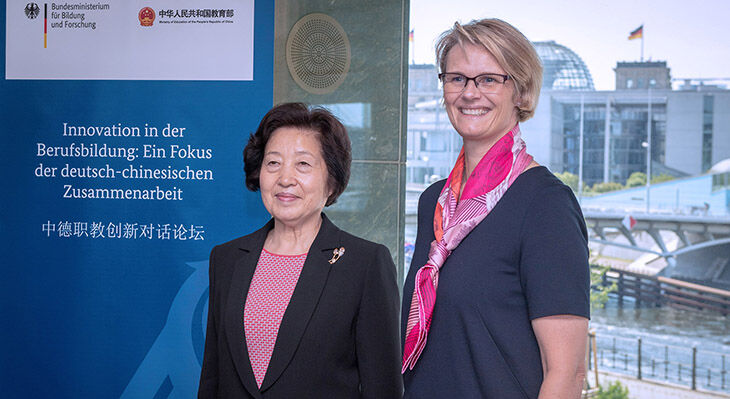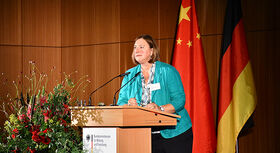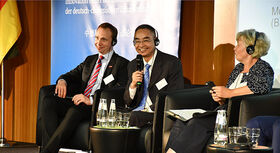First German-Chinese Dialogue Forum: Innovation in vocational education and training
In the spirit of a dialogue between equal partners, the first German-Chinese Expert Forum on Innovation in Vocational Education and Training took place on 26 June 2019 in Berlin. The event – conceived by GOVET – was formally opened by Federal Minister of Education Anja Karliczek and Sun Chunlan, Vice Premier of the People's Republic of China.

Speaking in front of an audience of around 180 at the Federal Ministry of Education and Research (BMBF), Federal Minister of Education and Research Anja Karliczek stressed that vocational education and training provided a “surety against the shortage of skilled workers”. In her own address, the Chinese Vice Premier Sun Chunlan also focused on the importance of modern VET. She reported on an “implementation plan” adopted in January, via which China is seeking to integrate companies more closely into the country’s vocational education and training system and to raise the level of training.
Vocational education and training in the light of digitalisation

A keynote speech delivered by Birgit Thomann, Head of the VET International Department at BIBB, also emphasised the opportunities that digitalisation would bring in terms of making vocational education and training more attractive – this topic was also a key aspect of all the specialist input at the dialogue forum. Ms. Thomann outlined the tasks that lie ahead in terms of shaping new requirements within the scope of a dynamic and flexible VET system and as part of a holistic occupational concept. Dr. Ralf Hermann, Head of GOVET at BIBB, chaired a panel discussion on “Vocational training in China and Germany”. Participants included Henrik Schwarz (BIBB), who spoke on the topic of “Changes to IT occupations in the wake of technological progress” and provided information regarding the latest developments in the process of their updating. He pointed out that the need for highly qualified skilled workers in this sector was growing rapidly and that digitalisation was a “challenge that needs to be tackled by society as a whole”. His Chinese colleagues reported on current forms of training in the country’s automobile industry.
Networking and innovation in vocational education and training

In the workshop session “Networking opportunities in German-Chinese VET cooperation”, iMOVE Head Dr Andreas Werner presented the relevant support instruments and services offered by iMOVE. The China Education Association for International Exchange (CEAIE) also showcased its activity as an exchange platform. A second parallel session delivered stimuli for vocational education and training research, one particular focus here was on “Training educational staff”. During the breaks, participants were able to find out about the projects in China that are being sponsored there by the DLR-PT (Project Management Agency at German Aerospace Centre) by means of funding from the BMBF. The specialist audience that attended the “Market place for innovations in the craft trades” was both interested and impressed by a sustainability prize winning 3D tooth printer (Bösing Dental), by an exoskeleton that is used to support care work (Bruderhaus-Diakonie Tübingen) and by a Citizen Science Sensebox Environmental Monitoring Station (University of Münster/BIBB). The Ausbildung Weltweit (Training Worldwide) Programme promoted the idea of greater mobility in China for German trainees and employers providing training.
How quickly is training development progressing?

In a final panel discussion, BMBF Departmental Head Susanne Burger asked Chinese VET experts what Germany could learn from China. The response came promptly: “Quicker decisions on strategic issues relating to training!” Mirko Wesseling from the German Confederation of Skilled Crafts (ZDH) countered by saying that the tradition and cultural heritage associated with occupations should not be forgotten, even in the face of the ongoing digital evolution. Within this context, he elaborated on the principle of consensus that exists with all social partners as a core element of decision making processes in German VET, which needs time in order to agree the right outcomes. Peter Burggräf, Professor of International Production, Engineering and Management at the University of Siegen, summed up by stating that German dual training was very well positioned with regard to the content it offered. However, he also remarked that declining trainee numbers were a problem.
Ms. Burger and Mr. Zhao Lingshan (CEAIE) marked the end of the first German-Chinese Dialogue Forum by underlining their desire for deeper networking opportunities. A suitable instrument would be the "1000 Teachers Programme", under which China would like to send 1,000 teachers annually for further training over the next five years. iMOVE will be responsible for implementing the programme in Germany. German experts will also undertake study visits to China before the end of the year.